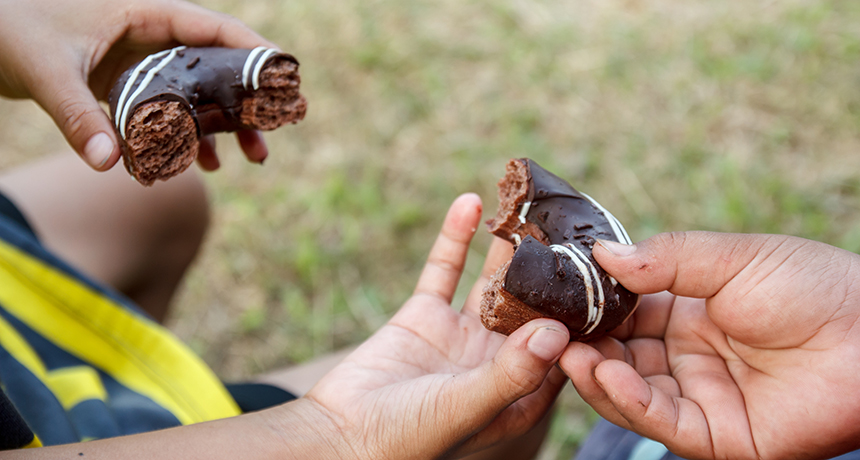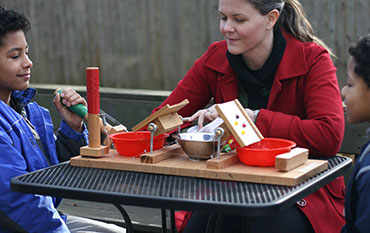Culture shapes sense of fairness
Treat tests show differences between kids in Western, other societies

SWEET DEALS Kids from many cultures develop a conviction that it’s unfair to receive fewer treats than another child, a new study finds. This notion emerges at younger ages in Western societies.
TairA/Shutterstock
From Boston neighborhoods to African villages, kids have a cow if another child gets more goodies than they do, a new study finds.
Reacting negatively to getting the short end of the stick develops at younger ages in Western nations than elsewhere, say Boston University psychologist Peter Blake and his colleagues. Culture influences the development of a sensitivity to receiving less than others by ages 4 to 10, Blake’s team concludes online November 18 in Nature.
Developing a concern to treat fairly others who receive less than oneself is another matter. Children display a willingness to forgo treats to avoid receiving more than a peer mainly in Western societies, and only upon reaching ages 9 or 10, the researchers report. Culture powerfully shapes the idea that others should be treated fairly, even at one’s own expense, the researchers suggest.
The new study is the first to examine how such fairness concerns develop in children from a range of societies.
Blake’s findings show that “some psychological motivations [for fairness] are exclusive to WEIRD children,” comments Harvard University psychologist Joseph Henrich. WEIRD refers to people from Western, educated, industrialized, rich and democratic societies — typical participants in psychology studies.
Blake’s team studied 866 children, ages 4 to 15. Youngsters came from a rural Canadian town, three villages in India, a Maya village in southern Mexico, five villages in the Andean Central Highlands of Peru, three working-class communities in the city of Dakar, Senegal, a set of villages in Uganda, and the Boston area.In each country, pairs of boys or girls of about the same age sat across from each other at a table. A board with a bowl at each end was placed in between them. A tray that could tilt forward or backward was placed behind each bowl. A third bowl was in the middle of the board, between both trays and beyond children’s reach. A researcher placed varying numbers of edible treats on each tray. Participants indicated before testing what types of treats they liked, such as Skittles candies in Canada and biscuits in Senegal.
In 12 or 16 trials, depending on the country, one child could reach a green handle and a red handle. Pulling the green handle tilted both trays so that treats fell into each child’s bowl. Pulling the red handle tilted the trays so that treats fell into the out-of-reach center bowl, ensuring that neither child got any.
In each trial, researchers provided a sequence of equal (one treat per child) and unequal (either four treats for handle pullers and one treat for their partners or vice versa) offers.
A statistical analysis of kids’ choices found that frequent rejections of getting fewer treats than a peer emerged between ages 4 and 6 in the United States and Canada. That tendency appeared at ages 6 to 8 in India, Peru, Senegal and Uganda, and at age 10 in Mexico. With the exception of Mexican youngsters, who lived in a small village where participants all knew each other well and may have been comfortable with a partner’s outsized reward, a desire to reject bad deals for oneself grew stronger with age.
Frequent rejections of treat offers that low-balled a partner only appeared at around age 9 in the United States and Canada and at age 10 in Uganda. The kids in Uganda occasionally encountered Western teachers and researchers, possibly influencing their notions of fairness, Blake’s team suggests.
Western children, who are encouraged to be independent, may reject advantages over peers to boost their social standing as good cooperators, the researchers speculate. Or, societies with market economies may emphasize making fair deals with strangers and friends alike, in which resources are split equitably so that exchange relationships can be maintained (SN Online: 3/18/10).
Children’s notions of fairness probably vary more than what’s reported in the new study, Henrich says. Kids of hunter-gatherers, small-scale plant growers and herders have yet to be tested.








